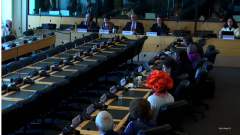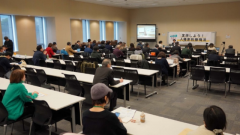Freedom of religion in Sri Lanka (HRC 28th, 2015, Joint-OS)
March 11, 2015
IMADR presented its joint oral statement with Franciscans International on “Freedom of religion in Sri Lanka” at the 28th session of the Human Rights Council. Whole text can be read below or downloaded here. ![]()
———
IMADR Oral Statement: 28th session of the Human Rights Council
Item 3: Clustered Interactive Dialogues with the Special Rapporteur on freedom of religion or belief
11 March 2015
Thank you Mr. President,
IMADR and Franciscans International appreciate the assurance given by the Foreign Minister of Sri Lanka during his intervention at the High Level Segment last week, which the new administration is committed “to work towards reconciliation and to unite the minds of the people of all ethnic and religious communities in the country”. We also welcome the move by the new administration in making a ‘Declaration of Peace’ and paying respect to the citizens of all ethnicities and religions who lost their lives due to the tragic conflict as well as other victims of violence since Independence. We hope these constructive moves by the new Government pave the way for long lasting reconciliation and religious harmony in the country.
However, in 2014 we drew the attention of this Council to the rise of religious extremism and the violence and hatred unleashed by Bodu Bala Sena (BBS). The former High Commissioner acknowledged the emergence of religious extremism and urged the previous Government to take measures against hate speech and such intolerance. Unfortunately, some member States dismissed our calls by categorizing those religious attacks as sporadic violence.
The Special Rapporteur has stated in his report, “a major problem underneath violence in the name of religion is a culture of impunity that exists in quite a number of countries”. Unfortunately, Sri Lanka has been such country, where State sponsored religious extremist groups have unleashed violence and hate against people of other faiths. We urge the new Government to appoint an independent body to investigate into all religious violence which took place in the past, and bring perpetrators to justice.
Similarly, there is also the need to pursue efforts to promulgate laws to deal with hate speech and violent activities arising from religious extremism. The statements made by some politicians and leaders of the BBS in the past few weeks have given us enough evidence that these forces will continue to use religious extremism to create instability and dissension among people. Together with other civil society organisations, we have consistently focused on the failure of the previous regime to facilitate an environment for reconciliation and religious harmony which led to intensification of tensions regularly.
We urge the Government of Sri Lanka to seize this new opportunity in making good governance a reality for affected communities by establishing mechanisms to promote inter-racial justice and religious harmony as recommended by the LLRC (Lessons Learnt and Reconciliation Commission).
Thank you Mr. President.





